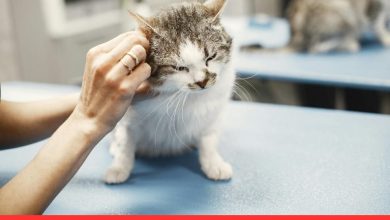Why Is My Cat So Skittish? Understanding Your Feline Friend


Have you ever pondered the peculiar behavior of your feline companion, particularly those moments when they seem inexplicably jumpy and skittish?
Cats, renowned for their enigmatic and occasionally unpredictable conduct, frequently exhibit skittish tendencies.
This article delves into the intricate realm of feline psychology, unveiling the mysteries behind their skittish nature.
Furthermore, it offers valuable insights into assisting your cat in overcoming these behaviors, fostering an environment of comfort and relaxation for both you and your feline friend.
Why Is a Cat Skittish?

Natural instinct
At the core of a cat’s skittish behavior lies its innate natural instinct as a hunter.
Cats are hardwired for the hunt, and their survival instincts are always primed.
They possess an acute sense of awareness that keeps them perpetually vigilant, forever on the prowl for potential threats or opportunities for a successful catch.
This hyper-awareness makes them ultra-responsive to sudden movements or even the faintest of noises.
It’s a survival strategy honed through millennia of evolution, allowing them to swiftly react to any perceived changes in their environment.
Past trauma
A pivotal aspect influencing a cat’s inclination toward skittish behavior harks back to their past encounters and experiences.
Cats bearing the weight of traumatic or negative events in their history can often display skittishness as a protective response.
Instances involving distressing episodes like abuse, accidents, or significant disruptions in their environment can cast a lingering shadow on their psyche.
These memories create a lasting impact, fostering a heightened state of vigilance and wariness.
Genetics
Genetics plays a significant role in shaping a cat’s temperament.
Some cats may inherently possess a genetic predisposition toward skittishness.
While genetics alone do not dictate behavior, they undeniably influence how a cat perceives and responds to their surroundings.
Certain genetic traits can make a cat more prone to nervousness or heightened alertness, contributing to their skittish tendencies.
Breed differences
In addition, it’s essential to recognize the role that breed-specific characteristics play in a cat’s propensity for skittish behavior.
Different cat breeds come equipped with their unique set of traits and temperaments, contributing to distinct behavioral patterns.
Genetics, coupled with these breed-specific traits, can render certain breeds more disposed to skittishness than others.
For instance, Siamese cats are renowned for their vocal tendencies and occasionally heightened anxiety levels, while Ragdolls tend to embrace a more relaxed and sociable demeanor.
Socialization
The early stages of a cat’s life are pivotal in shaping their behavior.
Proper socialization during kittenhood is paramount for their emotional development.
Kittens exposed to positive interactions with humans and other animals during their formative weeks are more likely to grow into well-adjusted, confident adults.
Conversely, a lack of early socialization or negative encounters during this crucial period can lead to a skittish disposition.
Cats raised in isolation or deprived of diverse stimuli during their early months may develop a heightened sense of fear and suspicion.
Health issues
Furthermore, it’s important to acknowledge the impact of physical well-being on a cat’s inclination towards skittishness.
A cat’s state of physical health can wield a substantial influence on its disposition.
When underlying health issues, such as injuries or illnesses causing pain or discomfort, come into play, it can heighten their irritability and render them more susceptible to abrupt, startled reactions.

How to Help If Your Cat Is Skittish
Create a safe space
To help alleviate your cat’s skittish tendencies, consider establishing a designated safe space within your home.
This sanctuary should serve as a refuge where your feline friends can retreat when they feel anxious or overwhelmed.
Ideally, this space should be a quiet room outfitted with their bed, toys, and a litter box.
Providing a tranquil environment can offer them a sense of security and a retreat from potentially stress-inducing situations.
Gradual exposure
When introducing your cat to new people, environments, or experiences, take a gentle and patient approach.
Gradual exposure is key to helping them overcome their skittishness.
Allow your cat to acclimate at their own pace, using treats and positive reinforcement to associate these encounters with positive outcomes.
Slow and steady wins the race when it comes to helping your cat feel more at ease in unfamiliar situations.
Regular playtime
Engaging your cat in regular interactive play sessions can work wonders in reducing anxiety.
Toys such as feather wands, laser pointers, or puzzle feeders not only provide physical exercise but also stimulate their mental faculties.
This mental and physical enrichment can go a long way in boosting their confidence and reducing skittish behavior.
Consistent routine
It’s crucial to understand that cats thrive on familiarity and predictability.
To mitigate their skittish tendencies effectively, it becomes imperative to establish and consistently maintain a structured daily routine for your feline companion.
This routine should encompass vital facets of their daily life, such as designated feeding times, scheduled play sessions, and established bedtime rituals.
The presence of predictability in their day-to-day activities fosters a comforting and secure environment, enabling them to anticipate what lies ahead.
Interactive engagement
While routines and health checks are vital, don’t underestimate the power of engaging your cat through interactive play and mental stimulation.
Incorporate toys such as feather wands, puzzle feeders, or laser pointers into their daily lives.
These activities not only provide physical exercise but also challenge their mental faculties, promoting cognitive well-being and boosting their self-assuredness.

Consult a veterinarian
It’s essential to recognize that instances of skittish behavior in cats may occasionally be rooted in concealed health issues.
These medical concerns might not always be immediately evident.
Therefore, if you harbor suspicions that your cat’s anxiety is potentially linked to an undiagnosed medical condition, it is advisable to seek the counsel of a qualified veterinarian.
A comprehensive evaluation performed by a veterinary professional serves the vital purpose of ruling out any underlying health matters, ensuring that your cat’s comprehensive well-being is meticulously attended to.
Conclusion
A cat’s inclination towards skittish behavior is a complex interplay of several contributing factors, encompassing their innate instincts, past life experiences, genetic predispositions, socialization during their early stages, and their physical well-being.
Gaining a comprehensive understanding of these underlying reasons serves as the foundational step in aiding your beloved feline companion in finding a greater sense of ease and confidence.
By incorporating the practical advice mentioned earlier and cultivating a nurturing and secure environment, you can progressively guide your cat towards a state of reduced skittishness and enhanced relaxation within their surroundings.
FAQs
Yes, it’s entirely normal for cats to exhibit skittish behavior, especially in unfamiliar or potentially threatening situations.
The time it takes for a cat to become less skittish can vary widely. Some cats may show improvement in a matter of weeks, while others may require months of patient care and socialization.
Certain breeds, such as Siamese or Oriental cats, are known for being more vocal and high-strung, which can sometimes manifest as skittish behavior. However, individual temperament plays a significant role.
There are various calming products available, such as pheromone diffusers or supplements, that may help reduce anxiety in skittish cats. Consult your veterinarian for recommendations.
If your cat’s skittishness becomes more severe or if they display unusual behaviors, consult a veterinarian to rule out any underlying medical issues that may be causing their distress.



